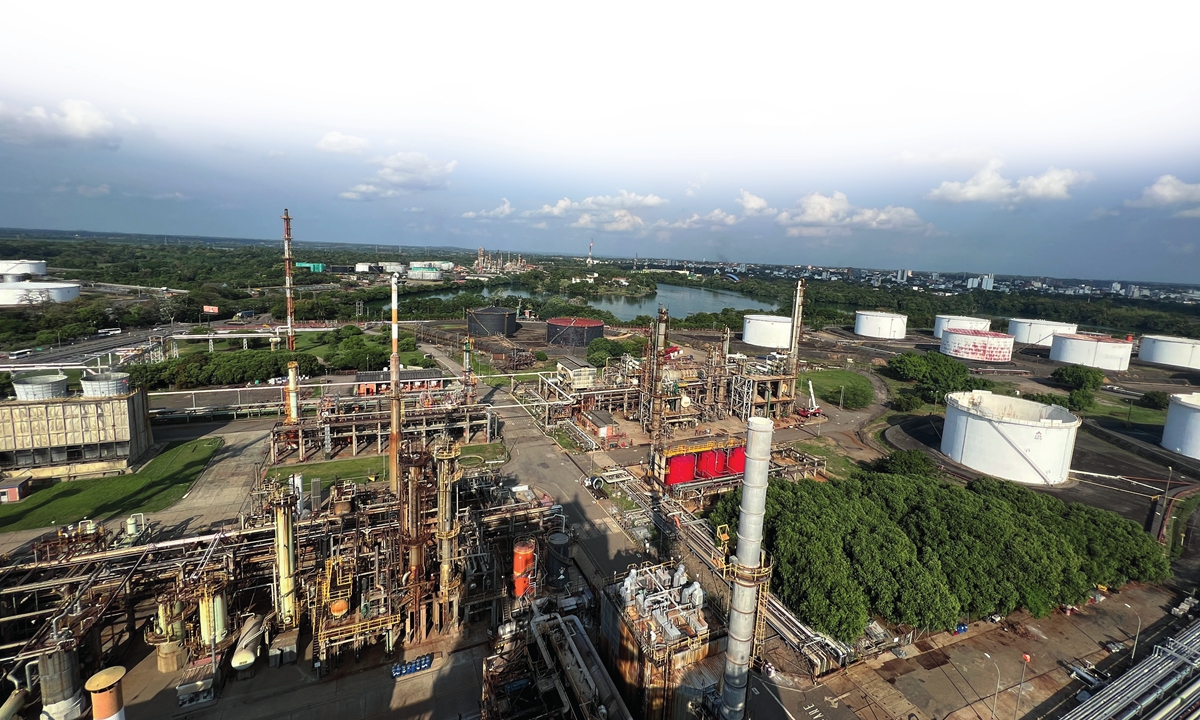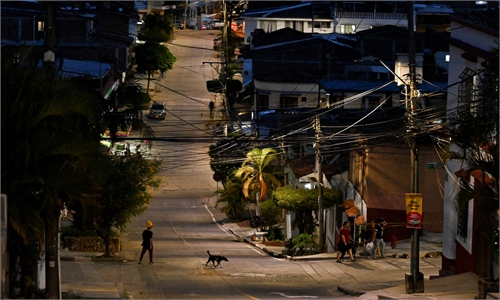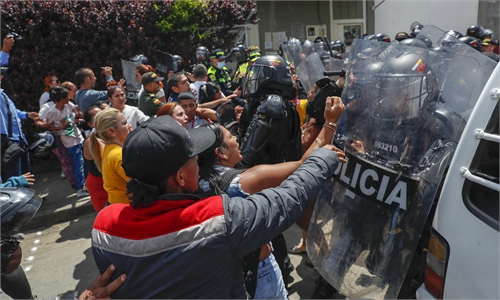
An oil refinery in Colombia Photo: VCG

People walk on streets in Filandia, Colombia. Photo: AFP
In a clearing of Colombia's Pacific jungle, the dense canopy encircles an area of desolation left by a clandestine refinery, where oil waste blackens everything underfoot, seeping into the soil and coating the vegetation.
The scent of moist earth and flowers is overpowered by the stench of chemicals from stagnant pools, the waste product from a rudimentary refining process that turns oil stolen from a nearby pipeline into a bootleg fuel known as pategrillo, or "cricket's foot," because of its greenish hue.
According to the UN's estimation, oil theft is on the rise: The volume stolen from two of Colombia's major oil pipelines has more than trebled since 2018 to an average of 3,447 barrels a day as of November 30, according to police data.
But little is known about the scale of the environmental impact of spills from tapping pipelines and from illicit refineries, which are often in remote and dangerous regions.
Reuters accompanied a police unit tasked with tackling oil theft in September to two sites near Tumaco, a Pacific port in southwest Colombia that is the terminal for the country's Transandino oil pipeline.
The jungle clearing sheltering the clandestine refinery, larger than a soccer pitch, remained blackened by oil though it was raided by police in March and the operation dismantled.
Twisted metal from destroyed barrels and more than a dozen metal cooking stills, capable of processing 500 to 1,000 gallons of oil, littered the site, just over an hour's walk from the small town of La Guayacana.
Nearby trees had been stripped of their leaves by polluting vapors that escape during the refining operations.
"The damage is extreme. The animals, the trees, everything is totally burned," said Colonel Johan Pena, commander of the police unit charged with tackling oil theft in Narino, a province bordering Ecuador that is known for cocaine production.
"Words aren't enough to show the world the damage."
Much of the nearby Transandino pipeline, which carries oil from Putumayo province on the far side of the Andes to Tumaco, runs above ground, making it an easy target for thieves.
Pipeline operator Cenit, a subsidiary of majority state-owned company Ecopetrol, did not respond to questions about the challenges facing cleanup operations in remote areas.
Raids
Colombia's police had knocked out 112 clandestine refineries in the region of Tumaco as of mid-October 2022, compared with 103 raided all of 2021 and 112 destroyed in 2020, Colonel William Castano, director of Colombia's rural Carabineros police force, told Reuters.
Typically, only one third of the stolen crude is used after it is refined at such sites, Castano said; the rest is dumped into the ground.
Castano said that an illegal refinery contaminates an average of three square kilometers of the surrounding environment, according to a police estimate. Reuters was unable to determine on what that estimate was based.
"It damages the fauna, the flora, pollutes the air, damages the soil, the subsoil, damages groundwater and also harms the tributaries that pass through these parts of the country," he said.
Colombia, one of the world's mega-diverse countries, boasts tens of thousands of different species and contains almost 600,000 square kilometers of jungles and forests, whose preservation is vital for tackling climate change because they store large amounts of carbon.
Reuters approached more than a dozen environmental groups, rights advocates, government agencies and international organizations who either said they had no detailed information on the extent of the environmental damage in Colombia from oil theft or did not respond to questions.
"We still don't know the environmental impacts it causes, because this is an illegal, clandestine process, hidden in unsafe places," said Hector Hernando Bernal, an official at the United Nations Office of Drugs and Crime (UNODC) responsible for the disposal of seized drugs and chemicals.
Colombia's Ministry of Mines and Energy said in a statement that continued spills "that harm people and ecosystems" were worrying and the government was investigating the issue.
Long-term impact
Oil pipelines are often tapped with hand drills, leaky valves and plastic tubing, and crude is stored and refined haphazardly, resulting in frequent spills, according to police, analysts and the UNODC. Depending on the size of a spill, ground contaminated by oil can take decades to heal and longer than a century to fully recover, Narino's environmental authority, Corponarino, said in a statement.
Police, analysts and scientists provided Reuters with similar estimates.
Oil spills on land smother soil pore spaces, restricting microorganisms' access to oxygen, said Martha Daza, a professor at Cali-based university Universidad del Valle's school of engineering of natural resources and the environment.
"By clogging these pores, water cannot circulate and the availability of oxygen for biotic activity in the soil is reduced, both for macroorganisms, like earthworms, ants, and plant roots, as well as for microorganisms," Daza said. "It's very damaging."
Rural communities not connected to main water supply depend on rivers and face health risks from spills, according to Bram Ebus, a consultant for the International Crisis Group who has investigated Colombia's illicit oil industry.
Reuters


